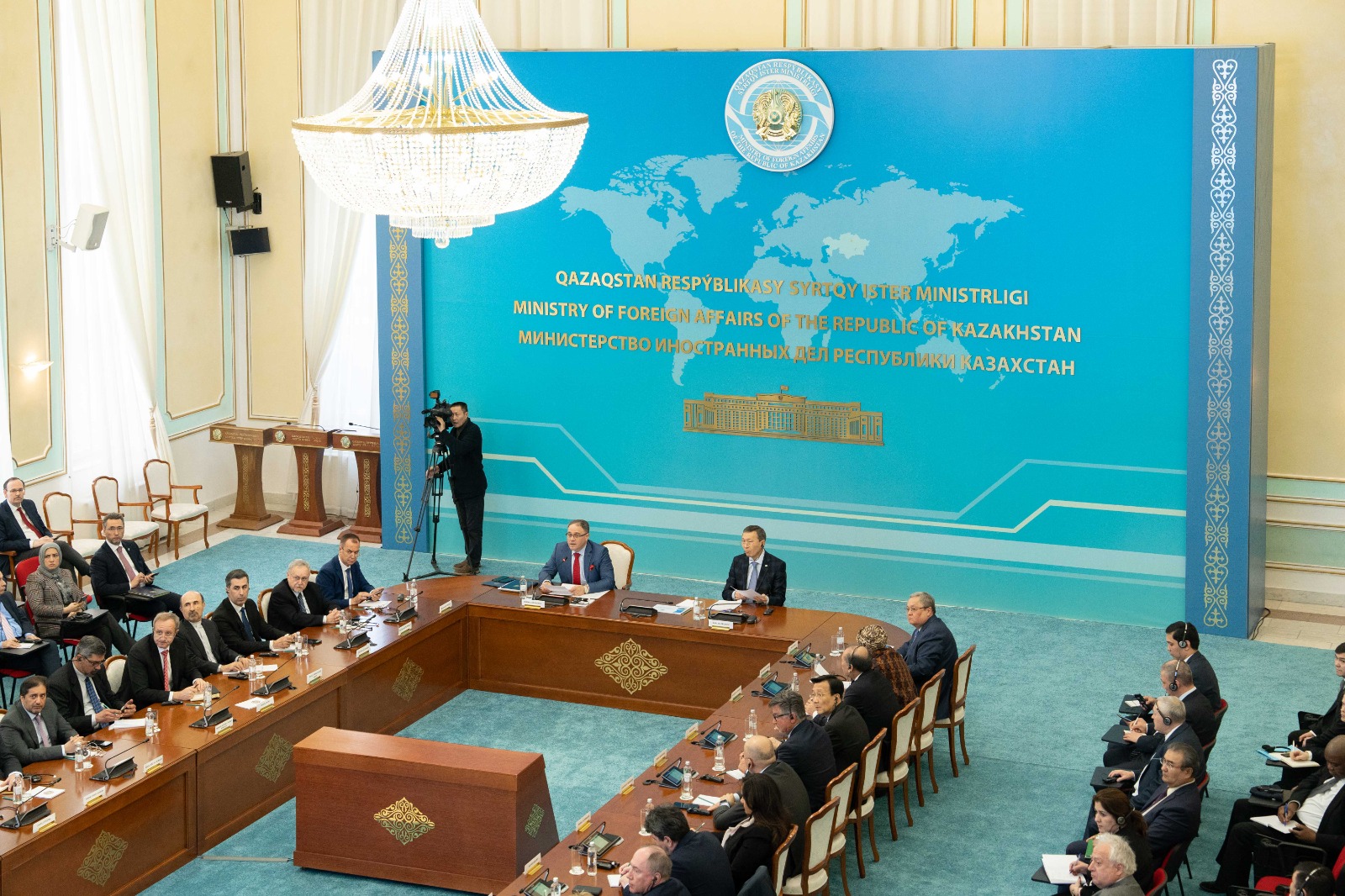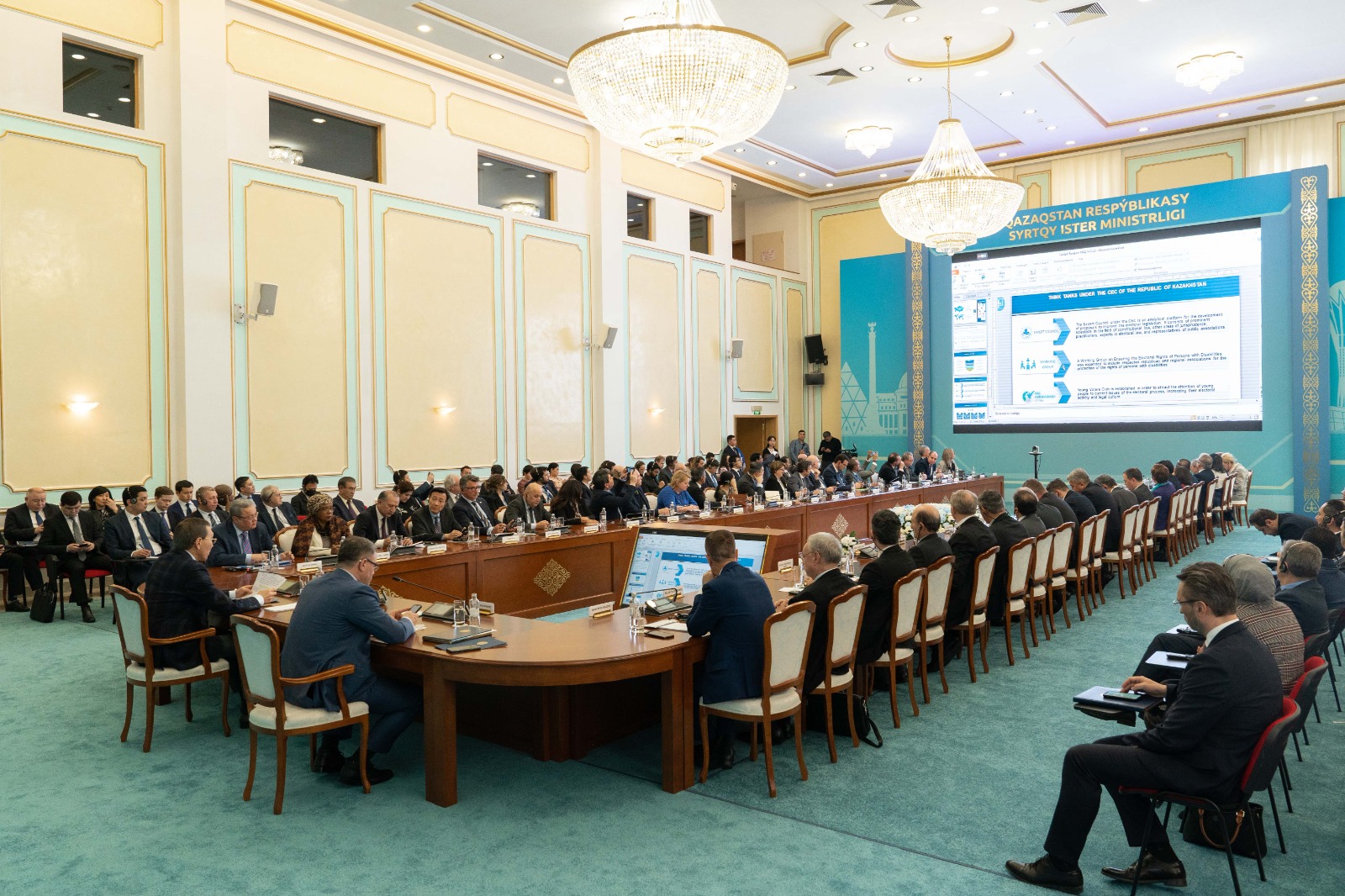ASTANA – Kazakh Deputy Foreign Minister Roman Vassilenko and the Central Election Commission (CEC) Chairman Nurlan Abdirov briefed the heads of diplomatic missions on the preparation and conduct of the March 19 parliamentary election to Mazhilis, the lower house of Kazakh Parliament, and maslikhats, the local representative bodies, on March 15, days before what could be the country’s most competitive election so far.

Deputy Foreign Minister Roman Vassilenko and the CEC Chairman Nurlan Abdirov briefed the heads of diplomatic missions on March 19 parliamentary election. Photo credit: election.gov.kz
In his opening remarks, Vassilenko said the parliamentary election is a milestone event for Kazakhstan, “marking the most transformative periods in the country’s modern history over the past year.”
“This upcoming election is going to be yet another step towards greater participatory democracy. The country is undergoing a comprehensive political modernization that is unique in its scope and depth. We are building a New Kazakhstan, which means, first and foremost, a Just and Fair Kazakhstan,” he said.
President Kassym-Jomart Tokayev’s dedication to implementing the reforms amid the internal and external challenges is a clear demonstration of his commitment to the formula of a strong President — an influential parliament — a responsible government, according to Vassilenko.
Vassilenko noted the importance of approaching the reforms “systematically and carefully, without rushing the process,” in line with President Tokayev’s emphasis on stability.
Outlining some of the major distinctive features of the upcoming election, Vassilenko said that this election “will be the most competitive parliamentary election in Kazakhstan’s modern history.”
“Participation of seven parties in elections is further contributing to creating a multi-party system by increasing plurality and political diversity. This was particularly evident during the televised debates between the representatives of the parties over the past few weeks when they focused on a wide range of social, economic, and political issues and presented competing visions for the country,” said Vassilenko.
He went on to say that 359 candidates running in the single-mandate districts are self-nominated, which he described as “unprecedented for our country.”
“We have enjoyed a lively campaign so far and can now expect many new faces in parliament as the threshold for political parties to enter the Mazhilis has also been reduced to five percent,” he added.

Photo credit: election.gov.kz
The upcoming election would complete Kazakhstan’s political reset cycle, according to Vassilenko. “They finalize the transition from a super-presidential system towards the model of a strong President, an influential parliament, and an accountable government,” he added.
Vassilenko said the inclusion of citizens in the political process is at the core of the transformative reforms.
“From giving people a vote on the constitutional amendments through the referendum to conducting presidential, parliamentary, and local elections, citizens of Kazakhstan have had a clear say on the direction of our country. The people of our country are at the heart of this process and will remain so going forward,” he said.
Following the deputy minister, Abdirov spoke on the most significant changes to the electoral system stemming from the constitutional amendments last year.
One of them is the transition to a proportional-majoritarian model, where 30 percent of Mazhilis members are elected in single-member districts for the first time since 2004.
“The transition to a new proportional-majoritarian model for the election of deputies to the Mazhilis and maslikhats gives the leaders of public opinion an opportunity to enter both local representative bodies and the Parliament of Kazakhstan,” said Abdirov.
Other changes include abolishing the Mazhilis quota for the Assembly of People of Kazakhstan, lowering the threshold from seven to five percent for political parties to get seats in the Mazhilis and local maslikhats, introducing “against all” column, and a 30 percent quota for women, youth, and persons with disabilities in party lists.
In the upcoming election, 38.1 percent of candidates in the party lists, or 107 people, are women, youth, and persons with disabilities. Overall, out of 281 candidates from seven party lists, there are 80 women, 201 men, and 12 ethnic groups represented.
The average age of candidates is 45.73 years, and there are 19 people under 29 years old, said Abdirov.
In single-mandate constituencies for the Mazhilis, 435 candidates were registered. Among them, 359 candidates, or 82.53 percent, were self-nominated, and 76 candidates, or 17.47 percent, were nominated by political parties. As of March 13, the final number of registered candidates for deputies of the Mazhilis is 385.
Of the registered candidates, 80.46 percent represent men, and 19.54 percent are women. The average age is 49.34 years old. Among the candidates, there are representatives of 10 ethnic groups.
“It should be noted that the election to the Mazhilis sparked great interest in society. We can see this in how the political parties responded by submitting their party lists. In the regions, citizens also realized the importance of the upcoming political campaign and actively nominated their candidates in districts under the majoritarian system,” said Abdirov.
The greatest competition is observed in Astana, with 38 and 40 candidates per each of the two mandates, and in Almaty, with 30, 28, and 27 candidates for each mandate.
There will be 10,233 polling stations open on election day nationwide. Seventy-seven polling stations have been opened at representative offices of Kazakhstan in 62 foreign states.
Over 12 million citizens are included in voter lists submitted by local administrative bodies to polling stations as of Feb. 26.
“We welcome cooperation with international institutions, non-governmental organizations, and the expert community,” said Abdirov.
The accreditation of international observers ended on March 13, with CEC registering 793 observers from 12 international organizations and 41 foreign countries.
On March 3, the election observation mission of the Organization for Security and Co-operation in Europe (OSCE) Office for Democratic Institutions and Human Rights (ODIHR) published an interim report, anticipating a broader public engagement in the election to Mazhilis and maslikhats.
The Commonwealth of Independent States Observer Mission also published its interim report on March 11.
“All necessary conditions have been created for international observers to fully observe the course of preparation and conduct of early elections of deputies to Mazhilis of the Parliament of Kazakhstan,” said Abdirov, stressing that the CEC will take all measures to conduct the election in strict compliance with the current legislation, and ensure openness, transparency, and democratic procedures of voting.
After the briefing, several ambassadors spoke with journalists about the aspects of the upcoming parliamentary election they find important.
Ambassador of the Slovak Republic to Kazakhstan Róbert Kirnág highlighted the participation of the citizens and their engagement that reflects the trust in democratic institutions.
“The introduction of a mixed system makes the election more interesting because people will be able to choose their candidates directly. I hope this will be reflected in people’s participation in the election,” he said.
“It is very important that people feel the effects of the reforms, that the reforms are implemented to improve both the material and non-material standards of living. People must be able to engage in democratic processes. Participation in the election gives such opportunity to all citizens,” he added.
Alan Hamson, Ambassador of Canada to Kazakhstan, Kyrgyz Republic, and Tajikistan, said he is looking forward to witnessing the fierce competition in the upcoming election, with some of the constituencies having over 40 candidates competing for one mandate.
“I do think that it is great to see so much competition in the single-mandate constituencies where we see a wide range of candidates from different political stripes competing. That is something which is going to be very interesting to watch. That is something quite new in these reforms that I think it is an important change,” he said.
The United States Ambassador to Kazakhstan Daniel Rosenblum expressed support for President Tokayev’s reforms, saying the program laid out important tenets for Kazakhstan’s future in political, social, and economic spheres. “We stand ready to help in any way we can towards the implementation of the reforms. If fully implemented, it is very promising for Kazakhstan’s future,” he said.
